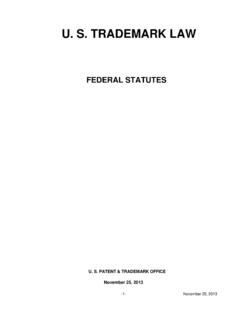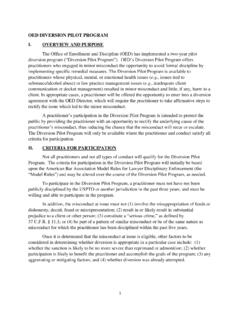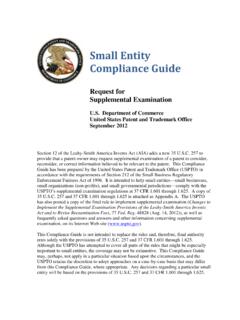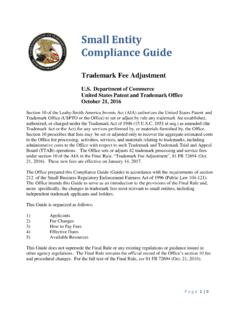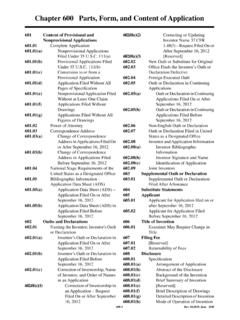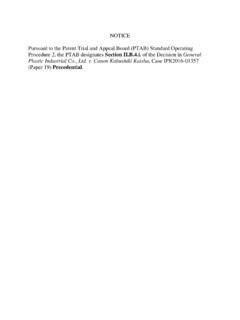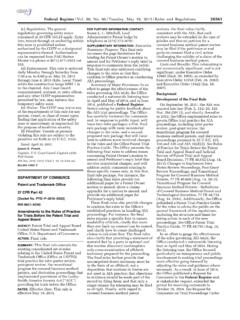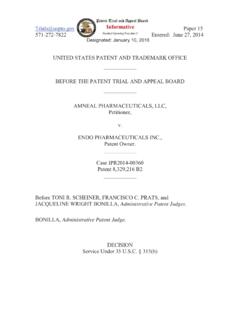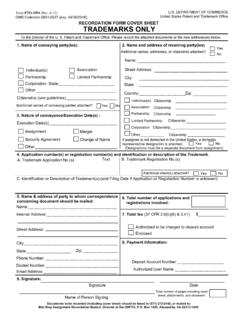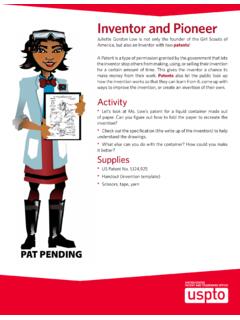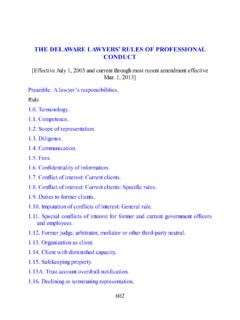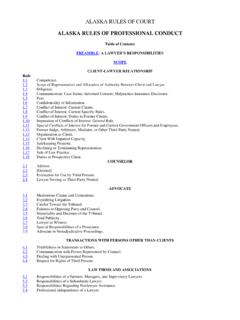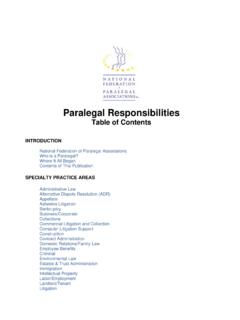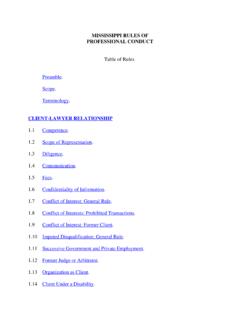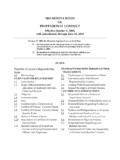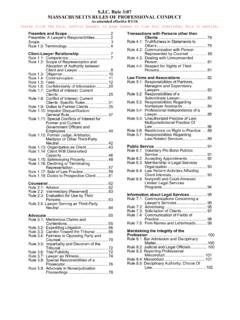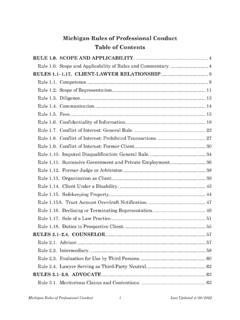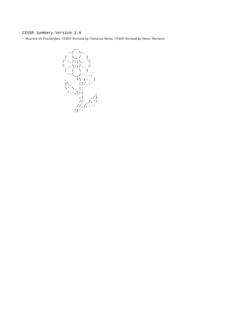Transcription of ABA Model Rules of USPTO Rules Professional Conduct of ...
1 Information in this document is deemed reliable but not guaranteed. Please refer to the official Federal Register notice available at 78 FR 20179 - 1 - ABA Model Rules of Professional Conduct USPTO Rules of Professional Conduct Rule Terminology (a) Belief or believes denotes that the person involved actually supposed the fact in question to be true. A person s belief may be inferred from circumstances. (b) Confirmed in writing, when used in reference to the informed consent of a person, denotes informed consent that is given in writing by the person or a writing that a lawyer promptly transmits to the person confirming an oral informed consent. See paragraph (e) for the definition of informed consent.
2 If it is not feasible to obtain or transmit the writing at the time the person gives informed consent, then the lawyer must obtain or transmit it within a reasonable time thereafter. (c) Firm or law firm denotes a lawyer or lawyers in a law partnership, Professional corporation, sole proprietorship or other association authorized to practice law; or lawyers employed in a legal services organization or the legal department of a corporation or other organization. (d) Fraud or fraudulent denotes Conduct that is fraudulent under the substantive or procedural law of the applicable jurisdiction and has a purpose to deceive. [Currently in 37 CFR ] Belief or believes means that the person involved actually supposed the fact in question to be true.
3 A person s belief may be inferred from circumstances. [Added to 37 CFR by this rule package.] Confirmed in writing, when used in reference to the informed consent of a person, means informed consent that is given in writing by the person or a writing that a practitioner promptly transmits to the person confirming an oral informed consent. If it is not feasible to obtain or transmit the writing at the time the person gives informed consent, then the practitioner must obtain or transmit it within a reasonable time thereafter. [Added to 37 CFR by this rule package.] Firm or law firm means a practitioner or practitioners in a law partnership, Professional corporation, sole proprietorship or other association authorized to practice law; or practitioners employed in a legal services organization or the legal department of a corporation or other organization.
4 [Added to 37 CFR by this rule package, replacing previous definition.] Fraud or fraudulent means Conduct that involves a misrepresentation of material fact made with intent to deceive or a state of mind so reckless respecting consequences as to be the equivalent of intent, where there is justifiable reliance on the misrepresentation by the party deceived, inducing the party to act thereon, and where there is injury to the party deceived resulting from reliance on the misrepresentation. Fraud also may be established by a purposeful omission or failure to state a material fact, which omission or Information in this document is deemed reliable but not guaranteed. Please refer to the official Federal Register notice available at 78 FR 20179 - 2 - ABA Model Rules of Professional Conduct USPTO Rules of Professional Conduct (e) Informed consent denotes the agreement by a person to a proposed course of Conduct after the lawyer has communicated adequate information and explanation about the material risks of and reasonably available alternatives to the proposed course of Conduct .
5 (f) Knowingly, known, or knows denotes actual knowledge of the fact in question. A person s knowledge may be inferred from circumstances. [Drawn from ABA Model Rule of Professional Conduct (b)] (g) Partner denotes a member of a partnership, a shareholder in a law firm organized as a Professional corporation, or a member of an association authorized to practice law. (h) Reasonable or reasonably when used in failure to state makes other statements misleading, and where the other elements of justifiable reliance and injury are established. [Added to 37 CFR by this rule package.] Informed consent means the agreement by a person to a proposed course of Conduct after the practitioner has communicated adequate information and explanation about the material risks of and reasonably available alternatives to the proposed course of Conduct .
6 [Currently in 37 CFR ] Knowingly, known, or knows means actual knowledge of the fact in question. A person s knowledge may be inferred from circumstances. [Added to 37 CFR by this rule package.] Law-related services means services that might reasonably be performed in conjunction with and in substance are related to the provision of legal services, and that are not prohibited as unauthorized practice of law when provided by a non-lawyer. [Added to 37 CFR by this rule package.] Partner means a member of a partnership, a shareholder in a law firm organized as a Professional corporation, or a member of an association authorized to practice law. [Added to 37 CFR by this rule package.]
7 ] Person means an individual, a corporation, an association, a trust, a partnership, and any other organization or legal entity. [Currently in 37 CFR ] Reasonable or reasonably when used in Information in this document is deemed reliable but not guaranteed. Please refer to the official Federal Register notice available at 78 FR 20179 - 3 - ABA Model Rules of Professional Conduct USPTO Rules of Professional Conduct relation to Conduct by a lawyer denotes the Conduct of a reasonably prudent and competentlawyer. (i) Reasonable belief or reasonably believes when used in reference to a lawyer denotes that the lawyer believes the matter in question and that the circumstances are such that the belief is reasonable.
8 (j) Reasonably should know when used in reference to a lawyer denotes that a lawyer of reasonable prudence and competence would ascertain the matter in question. (k) Screened denotes the isolation of a lawyer from any participation in a matter through the timely imposition of procedures within a firm that are reasonably adequate under the circumstances to protect information that the isolated lawyer is obligated to protect under these Rules or other law. (l) Substantial when used in reference to degree or extent denotes a material matter of clear and weighty importance. (m) Tribunal denotes a court, an arbitrator in a binding arbitration proceeding or a legislative body, administrative agency or other body acting in an adjudicative capacity.
9 A legislative body, administrative agency or other body acts in an adjudicative capacity when a neutral relation to Conduct by a practitioner means the Conduct of a reasonably prudent and competentpractitioner. [Added to 37 CFR by this rule package.] Reasonable belief or reasonably believes when used in reference to a practitioner means that the practitioner believes the matter in question and that the circumstances are such that the belief is reasonable. [Added to 37 CFR by this rule package.] Reasonably should know when used in reference to a practitioner means that a practitioner of reasonable prudence and competence would ascertain the matter in question. [Added to 37 CFR by this rule package.]
10 ] Screened means the isolation of a practitioner from any participation in a matter through the timely imposition of procedures within a firm that are reasonably adequate under the circumstances to protect information that the isolated practitioner is obligated to protect under these USPTO Rules of Professional Conduct or other law. [Currently in 37 CFR ] Substantial when used in reference to degree or extent means a material matter of clear and weighty importance. [Added to 37 CFR by this rule package.] Tribunal means the Office, a court, an arbitrator in a binding arbitration proceeding or a legislative body, administrative agency or other body acting in an adjudicative capacity. A legislative body, administrative agency or other body acts in an adjudicative capacity Information in this document is deemed reliable but not guaranteed.
